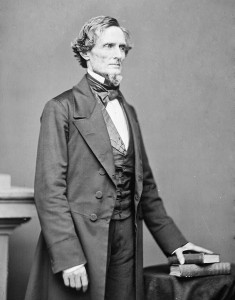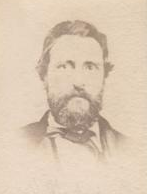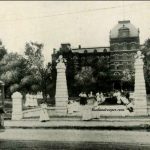Most of us are familiar with the fact that in the weeks following the surrender at Appomattox and the assassination of President Lincoln on April 15, 1865, Federal troops were hot on the trail of the Confederate leaders.
In particular there was a $100,000 bounty on the head of Jefferson Davis, the president of the Confederate States of America. Federal troops were tenacious in their pursuit because many believed Davis was complicit in the assassination of President Lincoln.

They finally caught up with Davis in Irwinton, Georgia on May 10, 1865, but that was NOT the first time Davis had been detained by the “law” in Georgia.
He was arrested by members of the Atlanta police force ten years earlier, and detained regarding pickpocket allegations.
I know.
It sounds a bit preposterous, doesn’t it?
It’s even more astounding when you realize that in 1855, Jefferson Davis was serving the Pierce administration as Secretary of War for the United States.
It seems that during the years he was Secretary of War, Jefferson Davis often traveled back and forth between Washington, D.C. and his home in Mississippi, and in doing so he often came through Atlanta.
On one such trip he shared a seat with James Noble who was well known to many in Atlanta, the founder of the big ironworks in Rome, Georgia.
Mr. Noble had but recently come over from England and was on a prospecting tour. He had with him a small hand satchel containing $1,000 to $3,000 in gold depending on which historical source is consulted.
When Atlanta was reached the satchel full of gold was missing. Mr. Noble gave the alarm, and the city marshal, E.T. Hunnicutt and his deputy, Ben Wilford, responded at once.
They learned that a quiet, unassuming man had occupied the seat with Mr. Noble, and after a short search they found the man, placed him under arrest, and carried him to Washington Hall.
The “hall” or hotel faced the Georgia railroad line and Lloyd Street (today’s Central Avenue).
Now the arrest of a person charged with picking pockets was unusual in Atlanta, and the prisoner was surrounded by a gaping, staring crowd.
The stranger took his arrest very quietly and said, “Isn’t Allison Nelson the mayor of your town? Well, I think if you will bring him here I can be identified.”
Allison Nelson (1822-1862) was the ninth mayor of Atlanta, who served from January, 1855 to July, 1855. He was summoned, and as he crossed the threshold he glanced around the room until his eyes rested on the prisoner.
With a shout of joy, his arms outreached, Mayor Nelson sprang forward, “Jeff Davis, God bless your soul! Where did you come from? Gentlemen, I fought under this man in the Mexican War. He is now Secretary of War.”
Introductions and explanations followed.
The officers began another investigation and finally recovered the money from a porter on the train.
It was, as they say a historic blunder, and the blunder continues because some of the details are a bit muddled when you dig deeper.
In his book Georgia’s Rome: A Brief History by Jerry Desmond the story is recounted with James Noble being the man who lost his gold on the train. In an 1893 newspaper story that originally appeared in the Atlanta Herald and was run in several newspapers across the south including the Carroll Free Press, the man who lost the gold was James Noble’s son, Samuel and was referred to in the 1893 article as “Sam Noble”.
Also, Mr. Desmond’s book mentions that the money was never recovered but years later the Noble family received a letter from a Catholic priest who told them the train’s conductor had confessed to taking the money on his deathbed.
It’s said that the missing money is the reason why the Noble family settled on Rome for their business venture instead of their first choice which was Chattanooga, Tennessee. Apparently, a banker in Rome was ready, willing, and “vocal” regarding funding the foundry venture.
The 1893 story mentioned this incident occurred in 1857 or 1858, but Allison Nelson was only mayor of Atlanta for seven months in 1855. He resigned his office in July, 1855 when the city council reduced a fine he had levied on two young men for destroying property. Nelson decided being mayor was no longer worth his time and headed west to Kansas.

As far as finding a news story published in the 1850s regarding Jefferson Davis being detained for being a pickpocket, I couldn’t find one after a single search. I’m assuming Atlanta officials were a bit embarrassed about the story at the time and made it go away. Then in the 1890s it was resurrected, but had a few errors in the details.
Still, it’s a pretty good story, right?




Leave a Reply